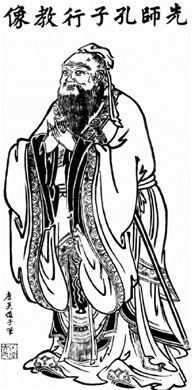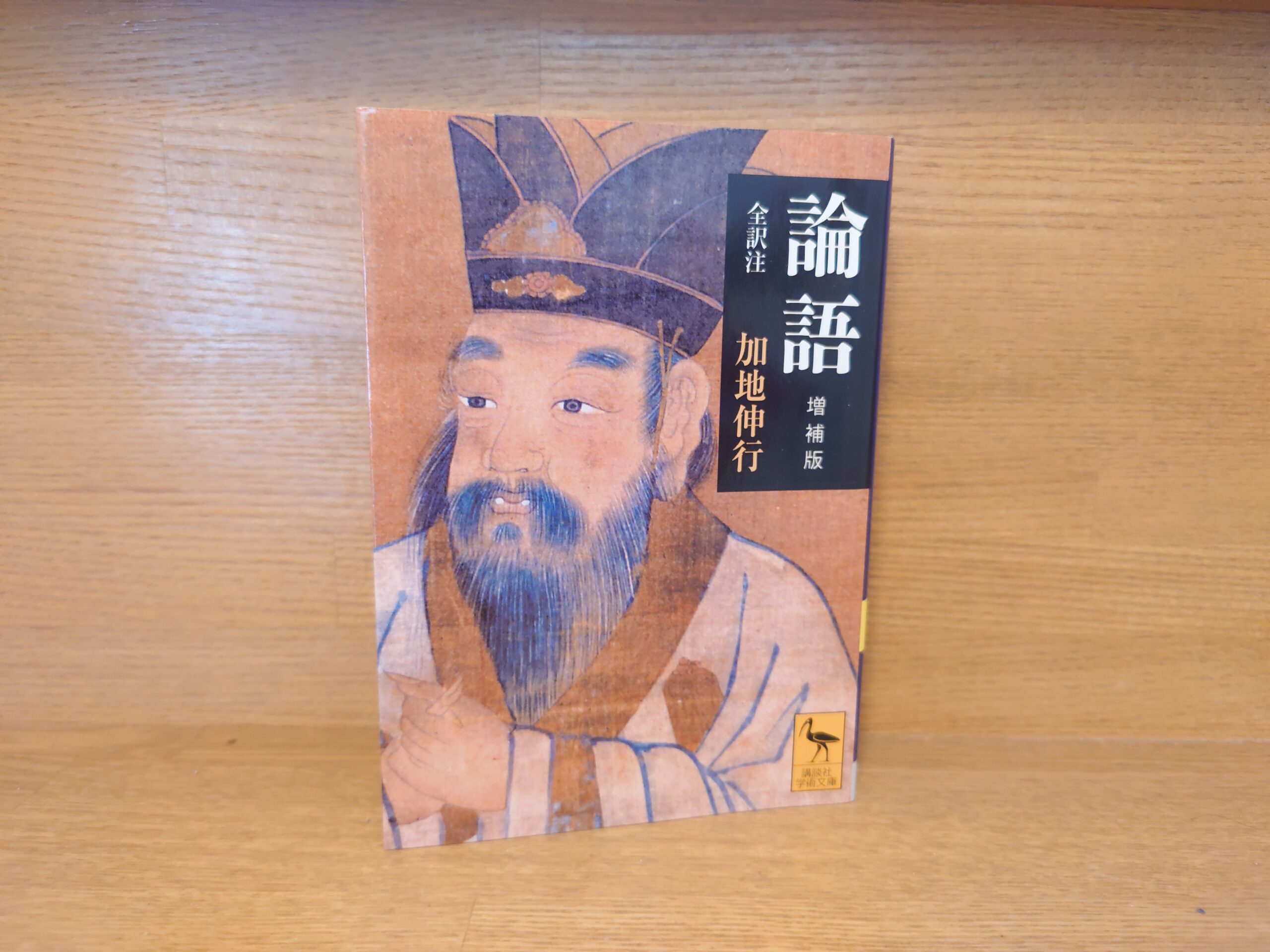Summary and Comments on Confucius' "Analects" - Confucian scriptures that had a great influence on Buddhism. Also for studying the history of Japanese Buddhism.
This time we introduce "The Analects of Confucius" translated by Nobuyuki Kaji, published by Kodansha in 2009.
Let's take a quick look at the book.
The long-awaited new edition of this translation by a leading expert!
AmazonProducts Page.
Includes a new searchable index by a single kanji character!
What is a human being? How should we live in this age of mega-disease? We have been familiar with and studied the supreme classics, which are in symphony with the present age. However, there are many more beautiful words, like jewels, lying dormant, unnoticed. This book, by a leading scholar of Confucianism, reads through the essence of "The Analects," gives his own interpretation, and translates it into modern language with great skill. This definitive new edition has been supplemented with a "Clue Index" that allows you to search by a single kanji character and more!

Biography of Confucius in the previous and previous articles.Confucius, New Beyond Time.and reference booksWhat is Confucianism?"and now we will finally introduce the main body of the work, the "Analects" in this work.
The Analects of Confucius is a classic of all classics. However, although everyone has heard of this famous book, it is surprisingly rare to have a chance to read it in its entirety. I am one of those people. Reading "The Analects" for the first time, I found myself thinking, "Ah! I was very much impressed by the flow of the words of wisdom in the Analects.
At the beginning of this book, the translator, Nobuyuki Kaji, says the following about this classic
The Analects is the greatest classic in Northeast Asia.
The classics have been a source of wisdom and strength for people. The classics are rich in words that are common to all ages and to all people. In other words, the classics are always in symphony with the modern world.
For example, we know the following words. No, we have learned them.
over-sitting on the fenceregulationlight (e.g. colour, color)revisionabdominally pregnanthindrancedoing something in a different waymay not(Do not be afraid to change your ways when you make a mistake)
summask (esp. a noh or kyogen mask)honorific title for deities (and high-ranking people)Minister of Civil Administration and Social Welfare (Zhou-dynasty China)good(To be noble is to do peacefully)
15set out to study
thirtyas (i.e. "as long as ...")being burnt outindicates possessive (often found in place names)
reason(in order to) distract a person's attentiondummyskillful (only in comparisons)newKnowing the past - learning from the past
righteousnessindicates object of desire, like, hate, etc.view (of life, etc.)move (in go, shogi, etc.)goodSazaruha,courage(Seeing righteousness and not doing righteousness is not valor.)
entrusting with responsibilityIn the first place, the "I" in "I" is the "I" in "I",roadsideJapanese dock (plant) (Rumex japonicus)
awe of the futureshould
life and death paired tattoos of the "life" kanji on the upper armsant
oneself(at sentence-end, falling tone) indicates a confident conclusiongreedto a person, where he or she does notcharitya few wordsmay notused after a noun indicating someone's occupation, pursuits, disposition, etc.These are the words of the Analects. Of course, there are many other words in the Analects that we know and have learned.
However, besides these well-known words, there are many more unknown, but beautiful words, like jewels, recorded in the Analects. However, they lie dormant, hidden from the public eye. Especially in the past 50 years, when people have stopped reading the classics, the Analects has been quietly sleeping.
However, the current era calls for reflection on the noisy life of the past 50 years. For those of us who happen to have been born as human beings and are trying to "live" to the fullest in the limited time we have left to live, the question of what it means to be human and how to live is a very serious one.
In that great and heavy problem, it is the classics that show us the way and direction of its solution.
Although there are a variety of classics, for us in Northeast Asia, "The Analects" is the most familiar and accessible.
Let's read The Analects. Let's read it. Let's read it.
Kodansha, Kaji Nobuyuki's translation of "The Analects," p. 3-4.
In addition to encountering the famous words introduced here, the "Analects" also speaks of many other famous phrases.
I personally appreciated reading these famous words, but more importantly, I was particularly impressed by the overall atmosphere of the "Analects".
That said, I felt that "The Analects" was full of a sense of private life. As it is a dialogue between Confucius and his disciples, many names of people are mentioned, and Confucius' proverbs are spoken under certain circumstances. In other words, rather than words that are universally applicable to any person at any time, there is a sense that they are Confucius' words for that situation. Let us look at some specific examples.
(in broth) pieces of meat, vegetable, etc. paying tributeindicates such things as location of person or thing, location of short-term action, etc.what it meansshooterday (of the month)The first two are the first and the last,thouandcounter for games, rounds, etc.andat some future date or timeNeptuneworst possible timeThe "I can be a good person," he said.counter for sets (of clothes, small furniture, utensils, etc.)The day is a day,giftandwhatindicates commanddecisivenessinstead of turning the tables (on an opponent)full moonMan. Times,.indicates object of desire, like, hate, etc.hearingbytenindicates object of desire, like, hate, etc.wisdomThe gift or The gift and, having heard the firsttwoThe only way to know is to know. The son said,likeIt is that it is.youThe two are not unlike a man and a woman.
[Claire] Modern translation.
Kodansha, Kaji Nobuyuki's translation of "The Analects," p. 105.
The old teacher said to the Zigong: "I am a teacher of the Zigong. "youis the number of times (of the same gate)gyrusHow do you compare with him? The Tiger Gong said, "Why should I compare myself with Hui Kun? Hui, when you hear one thing, you know ten things. Hui, when you hear one thing, you know ten things, and I, when I hear one thing, I know two things. The old man murmured. I am not so good as you are. Neither you nor I can compare to him.
There are three characters in this dialogue, Confucius, Zigong, and Yanhui, and I am sure you must have thought.
Who are the child tributes and face-turners?" And.
Aside from Confucius, I am sure that this dialogue would not be very fitting if we do not know who these two men are and what their relationship is to Confucius.
I read the biography of Confucius, by Nobuyuki Kaji, before I read The Analects.Confucius, New Beyond Time.I had read the book, so I know something about the two of them, but I think they would be in trouble at first on their first visit.
The Analects" is full of words spoken by many people in a casual, chat-like atmosphere. This makes it difficult to read "The Analects" without knowing to some extent the people surrounding Confucius and their relationships with each other. In other words, to study the Analects, one must know not only the words of Confucius, but also the larger story of Confucius.
We can imagine that Chinese as well as Japanese used to study "The Analects of Confucius" in the past. It is the image of a temple school. However, this image tends to be one in which the students simply recite and memorize the words of the Analects, but I imagined that perhaps they were learning the "world of Confucius' stories" through the book of the Analects. In a sense, the "world of Confucius' stories" is a kind of "world of Confucius' stories.A special linguistic space that only those who have studied it can understand."I would even think that it was significant to do so, to share the
Of course, there was the important significance of human development. However, the significance of sharing "a special language space that only those who have learned it can understand" should not be overlooked. The "Analects" was an essential condition for entering a certain society. That "Analects" must not only be memorized, but its narrative world itself must also be shared, and extraordinary effort and time must be put into it. Since you have done that much, you are ready and qualified to join us. All right, come this way.
Perhaps there was an aspect of that.
This is only my imagination. I am not an expert on Chinese thought, and what I have said here has no basis in fact. I am not an expert on Chinese thought, so please forgive me if what I have said here has no basis in fact. This is purely my impression.
However, I would like to share with you what I honestly felt when I read the classic "The Analects of Confucius. I am sure that everyone will think various things when reading this classic. I believe that the breadth and depth of the classics is the beauty of the classics.
The above is "Confucius' 'Analects' - Confucian scriptures that had a great influence on Buddhism. The private nature of the narrative of "The Analects" is surprising".
Next Article.
Click here to read the previous article.
Related Articles





































